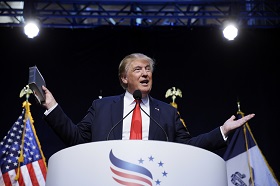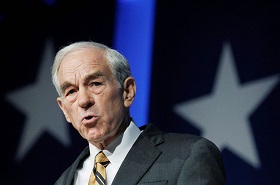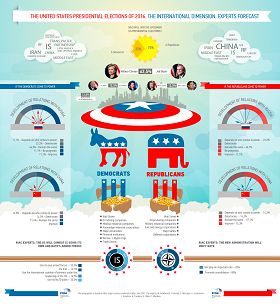Candidates faced off in the second Republican Presidential debate, held on September 16, 2015 at the Ronald Reagan Presidential Library in California. In contrast to the main Presidential debate that precedes the final vote, such events are a relatively new tradition dating back to 2000. Before the primaries, the Republican candidates will meet nine times, and the Democratic candidates will meet just six times.
The Republican debate has been the focal point of the current political season for many reasons. So, by mid September at least 17 contenders had declared their intention to seek the Republican Party’s presidential nomination. One of them – Rick Perry – has already left the race. Apart from politicians, the candidates include notorious businessman Donald Trump; MD and retired neurosurgeon Ben Carson, former Hewlett Packard CEO Carly Fiorina, and some other contenders, whose careers have been away from politics.
The specifics of the Republican debate
Given the unprecedented number of Republican candidates, Fox News, which is hosting the primary debate, announced that it would invite the top 10 candidates leading in the national polls to participate. Thanks to some national polls, Carly Fiorina was part of the top 10 in the second debate, while Rand Paul was nowhere to be seen.
Most GOP contenders have not yet made the details of their electoral platforms public. Having analyzed the Republican candidates’ official websites, U.S. political commentator Darren Samuelsohn came to the conclusion that they contain very little information about the candidates’ positions on key issues. Many candidates’ websites do not have any sections on policy, nor do they seek to set out their pre-election positions on key issues in U.S. politics today. This means that the televised debates, might well be the best chance the public has of getting a sense of where these candidates stand on the major issues.
As a rule, the political battle is focused on domestic priorities, although in the upcoming race issues relating to foreign policy, will also gain considerable prominence.
The foreign policy issues that spark the greatest concern among Republican candidates are: 1) illegal immigration; 2) the situation in the Middle East, including the recent deal on Iran's nuclear program and support for Israel; 3) Russian-American relations, especially in the context of the conflict in Ukraine.
The candidates’ pre-election rhetoric suggests that these issues seem to provoke both cross-party and intra-Republican controversy. It is important to note that the Republicans’ position on foreign policy is largely based on opposing the Obama administration.
Not many participants in the Republican primaries have foreign policy experience. Five have been or are now state governors and have not been involved in foreign politics by definition. Donald Trump, Ben Carson and Carly Fiorina have no political experience, especially when it comes to international relations. However, the three senators involved, namely Rand Paul and Marco Rubio, who are members of the Senate Committee on Foreign Relations, and Ted Cruz, who is a member of the Senate Armed Services Committee do have relevant expertise. Ohio Governor John Kasich served nine terms as a member of the House of Representatives, and his tenure in the House included 18 years on the House Armed Services Committee.
During the first item of the debate – Illegal Immigration – business mogul Donald Trump, pulling no punches, said that “The Mexican government is forcing their most unwanted people into the United States. They are, in many cases, criminals, drug dealers, rapists, etc.” The solution to this problem he sees as being to build a wall along the U.S.- Mexico border. In response to Obama’s administration program on legalizing immigrants, other Republicans offered less radical, but nonetheless resolute action against illegal immigration. Jeb Bush, Florida governor 1999-2007, took a less strict stance on this issue. In the second debate, Donald Trump implied that Bush was soft on immigration because his wife was born in Mexico. Bush pressed Trump to apologize for the comments he had made about Bush’s Mexican-born wife, but Trump refused. It should be noted that, as Governor, Bush supported a bill that was unpopular among the republicans, allowing illegal immigrants to get driving licenses.
The deal on Iran's nuclear program was another controversial issue in the debate. During the August debate, Ted Cruz, Marco Rubio and Rand Paul said they would not support the decision in the Senate. Trump said that Iran stands to benefit heavily, and if it were to sell shares, they would certainly be worth buying, because their price would quadruple. The former Arkansas Governor Mike Huckabee, quoting Ronald Reagan’s famous phrase “trust but verify,” expressed doubts that the deal could be verified thoroughly enough. Therefore, he felt, the deal “was unacceptable, as such a partner as Iran cannot be trusted.” At the September debate, the candidates’ positions on this issue had not changed.
Discussion of Russian-American relations in the Republican debate
Russian-American relations occupy a special place among foreign policy issues. During the election campaign seven years ago, Barack Obama and John McCain denounced Russian policy over the conflict in Georgia. However, six months after the election, a reset in U.S.-Russia relations was announced. In the unfolding campaign, the Russia issue is coming to the fore much more often, and criticism of Russia is gaining momentum and becoming much tougher.
When discussing Russian-American relations, Republican candidates most frequently recalled Hillary Clinton's record as State Secretary. In the first four years of Obama’s Presidency, she headed the U.S. State Department, giving the Republicans grounds to criticize her both for initiating a reset in relations between the two countries and its subsequent failure.
A cyber attack on the computer system of the Joint Chiefs of Staff, which took place on the eve of the first Republican debate, was another important topic of discussion. According to official sources in the Department of Defense, the cyber attack was sanctioned by the Russian government but conducted by civilians.
Donald Trump, who had declared shortly before the first debate that he would find common ground with President Vladimir Putin, appeared to take the least tough stance on relations with Russia. During the second debate, the discussion focused on what the U.S. billionaire had said. Donald Trump, without going into details, revealed that over his long business career, on a number of occasions he had to find common ground with different people, including politicians. Building on that, he was sure he would find a way of getting along with President Putin and other world leaders. Moreover, he said that finding a common language with the Russian President would make the whole world more stable. The candidate also assured his audience that he could make others respect him and restore respect for the United States, something Barack Obama had failed to do.
Other Republicans made rather tough statements. Neurosurgeon Ben Carson said in the first debate, that Ukraine “got rid of its nuclear weapons with the understanding that we would back them up. And now America just fails to supply lethal weapons to Kiev.”
In the second debate, Carly Fiorina, answering a direct question on how she planned to build relations with the Russian president, expressed a similar idea. The candidate said that she would “begin rebuilding the Sixth Fleet (Atlantic),” “begin rebuilding the missile defense program in Poland,” “conduct regular and aggressive military exercises in the Baltic states” and “probably send a few thousand more troops into Germany.” Carly Fiorina saw no point in negotiations with Vladimir Putin and believed that a demonstration of American military power is the only way to stop him.
Florida Senator Marco Rubio appears to be only Republican candidate to offer a detailed foreign policy doctrine [2]. It is based on three pillars: 1) strengthening U.S. military power by putting an end to sequestration and returning to Secretary Gates’ fiscal year 2012 military baseline; 2) protecting the U.S. economy in a globalized world; 3) providing moral clarity regarding America’s core values. The latter, according to Marco Rubio, lay in the fact that “America is the first power in history motivated by a desire to expand freedom rather than its territory.”
The senator criticized the U.S. administration for indecision, especially in foreign policy (regarding ISIS and China, in particular). The doctrine mentions Russia several times, but only in the context of the common problems of international security. During the second Republican debate Marco Rubio accused Vladimir Putin, rather than Russia, of personally seeking to destroy NATO and “restore the geopolitical power” of the country. The senator quoted the Russian president’s statement that “the collapse of the Soviet Union is the worst geopolitical catastrophe of the 20th century.” Moreover, he called Putin “a gangster,” who threatened Europe’s security and sought to replace the United States as the most influential partner in the Middle East. These were the arguments to substantiate his criticism of the foreign policy of the current U.S. administration, which, according to the senator from Florida, “gives permission to do so.”
Jeb Bush is likely to take the consequences of his brother’s and father’s foreign policy. In this regard, he has already said that, knowing what we know today, he would not have started the Iraq war. In addition, he made it clear that foreign policy was one of the priorities of his campaign. A couple of days before the official announcement of his presidential ambitions, he visited Europe, where he made a number of resonant statements on foreign policy. Speaking in Germany the day after the G7 summit, which was attended by Barack Obama, Jeb Bush focused on relations with Russia and criticized the Russian president. In his speech he put the emphasis on the fact that Putin was a “ruthless pragmatist who
will push until pushed back.” However, the candidate refrained from concrete statements concerning U.S. military involvement in the conflict. As anticipated, Jeb Bush criticized Barack Obama’s policies and, of course, the reset in U.S.-Russian relations started by Hillary Clinton in 2009.
The position of Kentucky Senator Rand Paul, a member of the Senate Committee on Foreign Relations and one of the main ideologists of the Tea Party movement is particularly interesting. Of all the Republican candidates, he is most regarded as an isolationist. After the outbreak of the conflict in Ukraine Rand Paul first took a rather moderate stance on Russia, but soon took a tougher line. However, he emphasized that the response to Putin should not be military. During the first debate, he said that the United States “must stop the vicious practice of spending money borrowed for projects that do not involve an immediate threat to national security.” During the second debate, he criticized Carly Fiorina, who spoke out against talks with Putin. He argued that, if Ronald Reagan had occupied a similar position during the Cold War, the outcome could have been quite different.
* * *
All the Republican contenders hold more or less “hawkish” views and compete with each other to seem tougher. Meanwhile, some experts believe that the overly aggressive nature of foreign policy views is likely to have a negative impact on electoral support for Republican candidates, as their proposed solutions require a significant increase in public spending. Following the debate, many U.S. political observers agreed that the Republican contenders are extremely challenged when it comes to foreign policy issues. This is due to the fact that at this stage of the campaign, they have not yet formed their teams of advisers to develop a nuanced program.
It is apparent that campaign rhetoric so far is largely shaped by ideological considerations and does not suggest a thorough analysis of the problems: its main purpose being to clarify the general attitude of each candidate towards the issues that are of interest to the general public. Judging by the fact that the issue of Russian-American relations was raised in the Republican candidates’ first and the second meeting, it is clearly becoming increasingly important. According to the candidate’s rhetoric, Russia poses a much less serious threat than the Islamic State. The second debate put an increased focus on the relations between the United States and Russia, but specific substantive aspects of these relations were not discussed. Neither the crisis in Ukraine [3], nor Russia’s annexation of Crimea, were mentioned, although these events were the main reasons for the aggravation of bilateral relations.
The Russian “enemy” is personified by President Putin. All the proposed measures are aimed largely against him, rather than against the state. Marco Rubio made a notable statement that, if elected, he would visit Moscow and hold talks with both the president and the opposition forces that need support in order for Russia’s continued democratic development.
It is too early to draw any conclusions on possible changes in American foreign policy under any of the potential Republican of Democratic presidents. First, election campaign rhetoric does not necessarily reflect realpolitik. Resounding statements are made to win momentary popularity and outperform their political rivals in eloquence. Second, the proposed changes will take place in the first half of 2017 at the earliest: elections to Congress will be held together with the Presidential election and may change the political balance of forces. The appointments to key government posts will be similarly significant. It is virtually impossible to predict how the situation in Ukraine and other hot spots will develop, since events are evolving rapidly and have the potential to dramatically affect the candidates’ positions and even the policy of the United States.
1. This refers to the scandal around Hillary Clinton’s use of her personal email account to conduct government business as Secretary of State. An investigation is underway, following which she may be forced to partially or fully declassify the contents of correspondence, since the latter may contain information about a terrorist attack in Benghazi.
2. Marco Rubio’s official campaign website has a section on foreign policy titled Rubio Doctrine (https://marcorubio.com/issues/this-is-how-america-should-lead/). Besides, the senator published his program article Restoring America’s Strength in August issue of Foreign Affairs (https://www.foreignaffairs.com/articles/united-states/2015-08-04/restoring-america-s-strength).
3. Ukraine was mentioned just once, when Donald Trump said in his speech that he would find common ground with Putin on Ukraine and other issues of bilateral relations.










